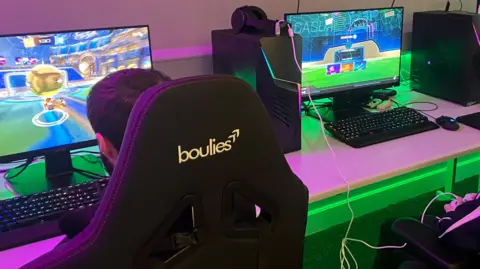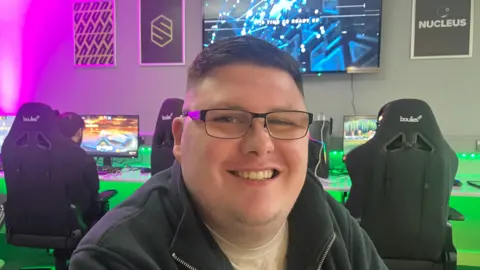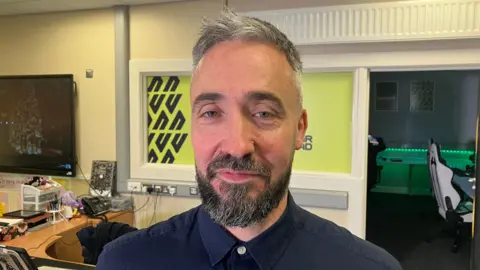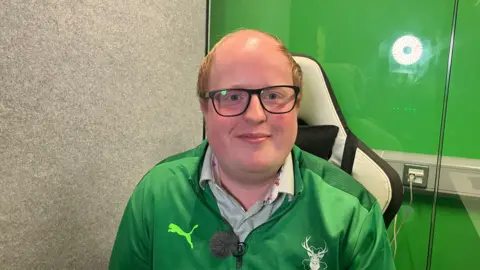Gamer to creator - taking esports from bedroom to classroom
 BBC
BBCA Belfast special school is the first in Northern Ireland to open a dedicated esports classroom for pupils.
Esports - or competitive gaming - has grown in popularity and will even have its own Olympic Games in 2025.
The classroom at Cedar Lodge school, in north Belfast, is called Nucleus and is home to the Cedar Squad Esports team.
Students are also able to study for a BTEC qualification in esports, a course offered by very few other schools in the UK
'A growing industry'
Former Cedar Lodge pupil, 22-year old Kyle Faulkner, is already studying for an esports degree at Belfast Met.
He has also come back to the school to help set up their esports class.
"When I was about 13 I started watching professional FIFA and Call of Duty," he told BBC News NI.
But he has taken his interest beyond playing or watching and is hoping to make a career in esports.

"I want to be a content creator, make videos, TikTok, livestream," said Kyle.
"I love editing videos and stuff, it's enjoyable.
"It's a growing industry, in five years' time it's going to be one of the biggest industries in the world."
The 2024 Esports World Cup, controversially held in Saudi Arabia, had a $60m (£47.1m) prize pot.
What are esports?
Esports is simply the short name for electronic sports.
Just like football players play football together, esports players play computer games against each other.
But it doesn't just take place inside living rooms between friends and family. Huge esports tournaments now take place all over the world in big arenas with large crowds.
For big tournaments with well-known players, fans from all over the world may tune in to watch the action online, and competitors may even get paid for doing it.
They are also likely to play in teams, rather than on their own.
'A learning curve'

Cedar Lodge's vice-principal Peter Wilmont said it is the skills developed by the pupils through esports that really count.
"We became very excited about what the opportunities were with esports, both at a competitive level and also at a curricular level," he said.
Mr Wilmont added he's been "pleasantly surprised" at how skilled the school pupils have been.
"Their technical knowledge, their ability to problem solve...we have young people who are organising events.
"They understand how to budget, how to advertise, to promote, to market and also to bring people in."
He said watching the pupils grow with the sport has "been a learning curve" for the staff as well.
"I have to admit, I'm not a gamer."
The school funded the classroom and equipment through their own budget, but also by seeking help from local businesses.
"Budget and expenditure within a school can be difficult at times," Mr Wilmont said.
"We've invested within our own funding channels, we have spoken to local companies who are working with us on furniture manufacturing, so we have been creative."
Esports qualifications

The course director in Esports at Belfast Met and manager of the Ireland Esports team, Michael Smyth, has also been involved in helping the school set up the lessons.
"The facilities here are fantastic," he said.
"Not so long ago we were having a discussion about bringing the esports qualification and the championships here and the room has just developed so quickly.
"It's a fantastic opportunity, especially to get into the curriculum because it's not in the traditional curriculum subjects."
He said that meant there was a "pathway" for pupils to get qualifications in esports and then go on to study for a degree.
That pathway to a career, according to Kyle Faulkner, made it easier to convince his parents that studying esports was not just about playing games.
"For me it wasn't necessarily a hard conversation, it was more me just explaining the outcomes of it," he said.
"Once we got over that initial talk they were fine, they were happy days with it.
"But I do understand that with a lot of younger kids if they tell their parents they're going to do esports, they'll think 'you just going to sit and play games all day,' which it actually isn't."
He added: "It's a lot of work. There's a lot of kids that love playing video games.
"If they love sitting playing video games say six hours, seven hours a day, why not have them do education on it?"
